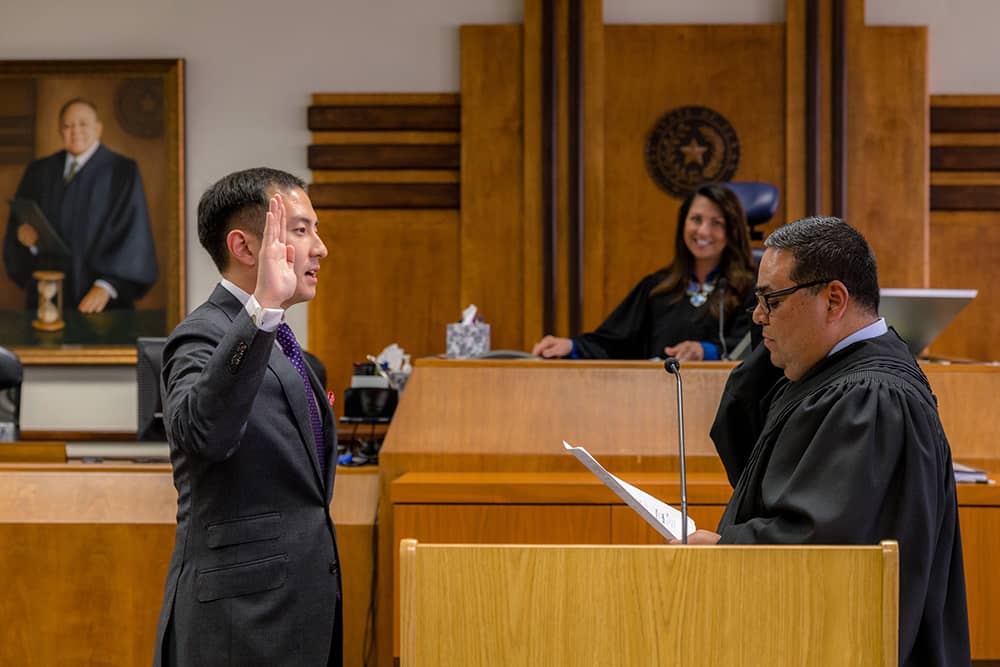
New Mental Health Court Aims to Increase Treatment While Reducing Jail Stays: Nick Chu will take over the court Oct. 1 – News
Nick Chu is sworn in, after being appointed to the new Probate Court No. 2 (Provided by Nick Chu)
Think of the most shockingly brutal and random attacks you’ve ever read about, and the attacker was almost certainly out of touch with reality. Whether such violence is best stopped by jailing people or treating them is an ongoing debate in America, but, as it is, schizophrenia is treatable and our jail is full.
That’s why advocates and officials alike are devoting much of their time to developing new routes for mental health diversion – instead of sending folks to jail, sending them to doctors. Ideally, that diversion can happen before a criminal case even goes to trial. Enter the county’s new Probate Court No. 2, created by the Texas State Legislature this session.
Probate courts don’t get as much attention as your typical criminal courts, but they play a crucial role in keeping communities safe. Probate judges make decisions about court-ordered mental health treatment in civil cases. Judge Nick Chu will be especially focused on that element of his new job starting Oct. 1, when he takes over Travis County’s second probate court. (The first is run by Judge Guy Herman.)
Part of what makes a probate court a powerful tool in mental health diversion is its division from the criminal process. In a criminal case, if a defendant is deemed incompetent to stand trial, they are placed in jail and on a waiting list for care at psychiatric hospitals. In Texas, that waiting list is so long that many defendants instead spend a year or more in solitary confinement in jail. Compare that to when a probate judge rules that someone needs treatment because they are a danger to themselves or others. Jail isn’t on the table, and the court order isn’t just for the patient – it’s for the hospital. Providers must make that treatment happen.
After six years as Justice of the Peace for Precinct 5, running one of the busiest courts in the county, Chu is well connected in the county attorney’s office that handles misdemeanors like criminal trespassing. These low-level offenses often bring unhoused Austinites with severe mental health issues to the county’s attention. Chu says he’s planning to do all he can to help as prosecutors drop criminal cases and move mentally ill defendants over to the civil side, where Chu can ensure they receive treatment when it’s merited. This process dovetails with the county’s proposed mental health diversion center, which would create beds for involuntary mental health treatment.
“Right now mental health diversion is mostly thought of in the sense of diverting them away from criminal sentencing and prison time and final conviction,” Chu said. “The idea behind the county’s mental health diversion center is moving that target backwards in time, and saying, OK, this person picked up a criminal trespass case, but mental health caused them to show up in the place they weren’t supposed to be.”
Chu will handle some other relatively small cases, too – sorting out inheritances after death, assigning guardianships, and determining conservatorships (like Britney Spears’ famous conservatorship – but hopefully not like hers, if you know what I mean). “The easiest way to think about the probate court is that it’s a misnomer,” Chu said. “Really it’s a mental health court first, that also handles probate matters.”
As for mental health cases, there are a few main ways people end up in probate court. The first is that police identify a need after being called to help people in a suicidal state, or when, “a friend or family member or coworker says hey, something’s not right with this person, and police from the mental health unit checks up on them,” Chu says. In other cases, doctors in a hospital find that a patient doesn’t have a physical condition but needs specialized psychiatric care that they are resistant to. But the county attorney’s office can identify cases too.
One of Chu’s key goals as the new mental health probate judge is to make transitions from criminal to civil court smooth. “There’s a criminal silo and there’s a civil silo, and my goal is to break down those silos,” he said. “My goal is to make it an easy transition, in one system, so we don’t lose time because of this transfer.”
How much will this process increase the number of overall cases in our two probate courts? Chu says it’s “a little bit of an unknown,” but it would be “a good increase, because it’s less folks’ cases in the criminal system and more treatment in the civil system.”
“I think folks just need to understand there is no silver bullet for all of this. We can’t snap our fingers and say this [one process] is what it is and this is how it’s solved. It’s going to take a lot of bringing people together, creative thinking, and making sure these things get done and that they’re at the forefront of people’s minds.”
Got something to say? The Chronicle welcomes opinion pieces on any topic from the community. Submit yours now at austinchronicle.com/opinion.







